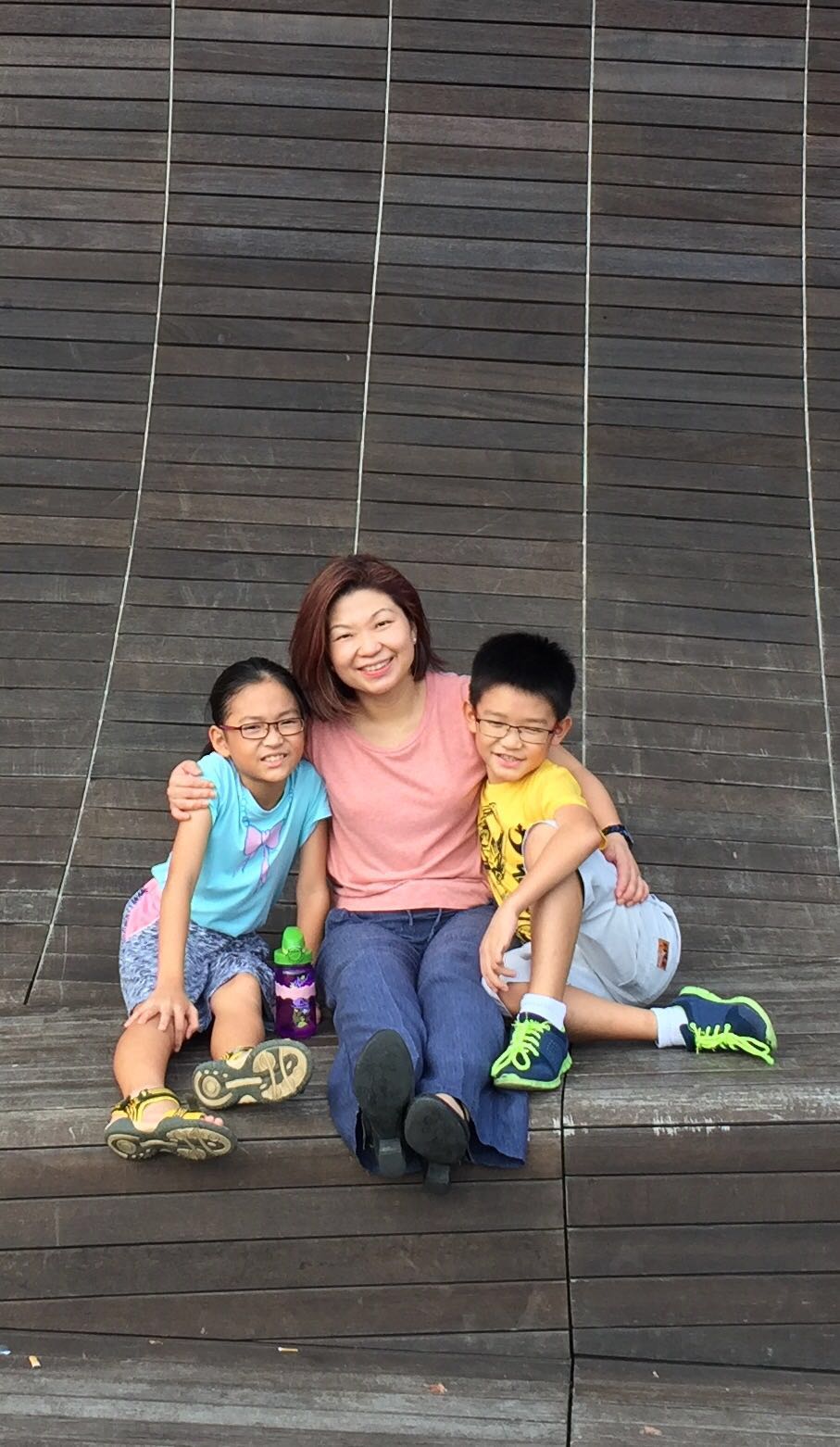
Ter Cheah, with her 11 year old daughter and 9 year old son at Henderson Wave
Once upon a time, there was a little girl. On the outside, she looked just like every other girl. But to people who knew her, she was a special little girl. While others her age pranced and danced, she could only sit and watch from the side. Sometimes, she felt like Cinderella, who had lost her shoe while running away from the party. This little girl too, had lost something precious, but unlike Cinderella, she could never get it back. And it made her wonder; would she ever find her happily ever after?
Meet Ter Cheah, a little girl in search of her happily ever after. And this is her story.
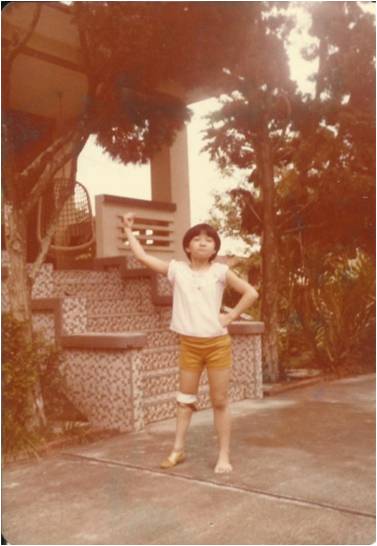 Young Ter Cheah confidently striking a pose with her new “leg”
Young Ter Cheah confidently striking a pose with her new “leg”
45 year old Tan Ter Cheah can be considered the envy of most women. A lawyer by training and now working part-time at one of the Big Four auditing firms, Ter Cheah juggles a career while looking after two children, an 11 year old girl and a 9 year old boy, together with her doting husband.
To the outsider, Ter Cheah has it all; a meaningful career, a wholesome family. But what they may not know is that beneath the girlish appearance and charm and concealed beneath her right trouser leg, is a pillar of strength and courage that Ter Cheah has fortified over the years.
While Ter Cheah may look like the average woman on the street, there is something that sets her apart physically. For her, there is no strutting about on ultra-high heels, and no donning of short skirts. To the keen observer, one may notice Ter Cheah's right calf to be a shade darker than her left. Look closely enough and one would realise that her right calf is actually a prosthesis, one which she has worn since the tender age of six and a half.
"The Missing Shoe"
The years may have passed, but Ter Cheah still vividly remembers when it started. It was during swim class in 1978, when her swim instructor corrected the position of her right ankle as she practised kicking, and she yelped in pain. She had experienced a sharp unbearable pain which had sent a jolt up her entire body, creating aftershocks of intense pain.
Consultations with the doctors finally confirmed the diagnosis. It was Synovial Sarcoma (at the ankle of the right foot), a rare form of soft tissue cancer. In a time when technology was less advanced than it is today, the only fighting chance Ter Cheah had was to undergo a mid-calf amputation to curb the spread of the cancer cells.
Too young to know any better, the choice was not Ter Cheah's to make. Rather, the weight of the decision fell on her parents who, between choosing a limb over their daughter's life, were left with no other option.
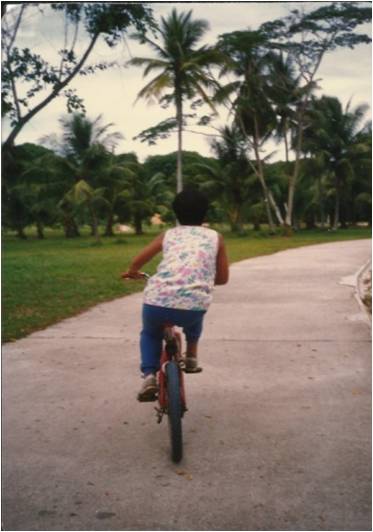 Young Ter Cheah cycling at the park
Young Ter Cheah cycling at the park
Looking back, Ter Cheah remembers feeling angry and confused over the loss of her right lower leg. But now, as an adult and a mother herself, she comprehends her parents' emotions, and how much her diagnosis must have affected them.
At that time, particularly where a lack of awareness of people with disabilities led to prejudice and stigma, Ter Cheah remembers that there were people who said that if you were physically different, you were also likely to be not as bright as you were lacking. But Ter Cheah's mother had prepared her for this.
A child's mind is easily shaped by the environment and people around them so, growing up, Ter Cheah's mother never made her feel different and made sure she was treated the same as her other three siblings. If anything, her mother made her work even harder, so that she would not be treated any lesser than other children.
New Adjustments
After her leg amputation, Ter Cheah was put on crutches, before eventually being fitted with her prosthesis. It was challenging for a child of seven to adapt; while her peers had no issues running around playing catch, Ter Cheah found herself having to sit out the fun and deal with transitioning from hopping on one leg to balancing on her new leg.
Although there was something different about her, ironically, all this time, Ter Cheah never felt different from others. She was still the youngest child who found joy bantering with her siblings, and even greater joy teasing her brother. In school, she was made the "register girl" who was in-charge of marking her class attendance and bringing it back to the school office, a role she found empowering.
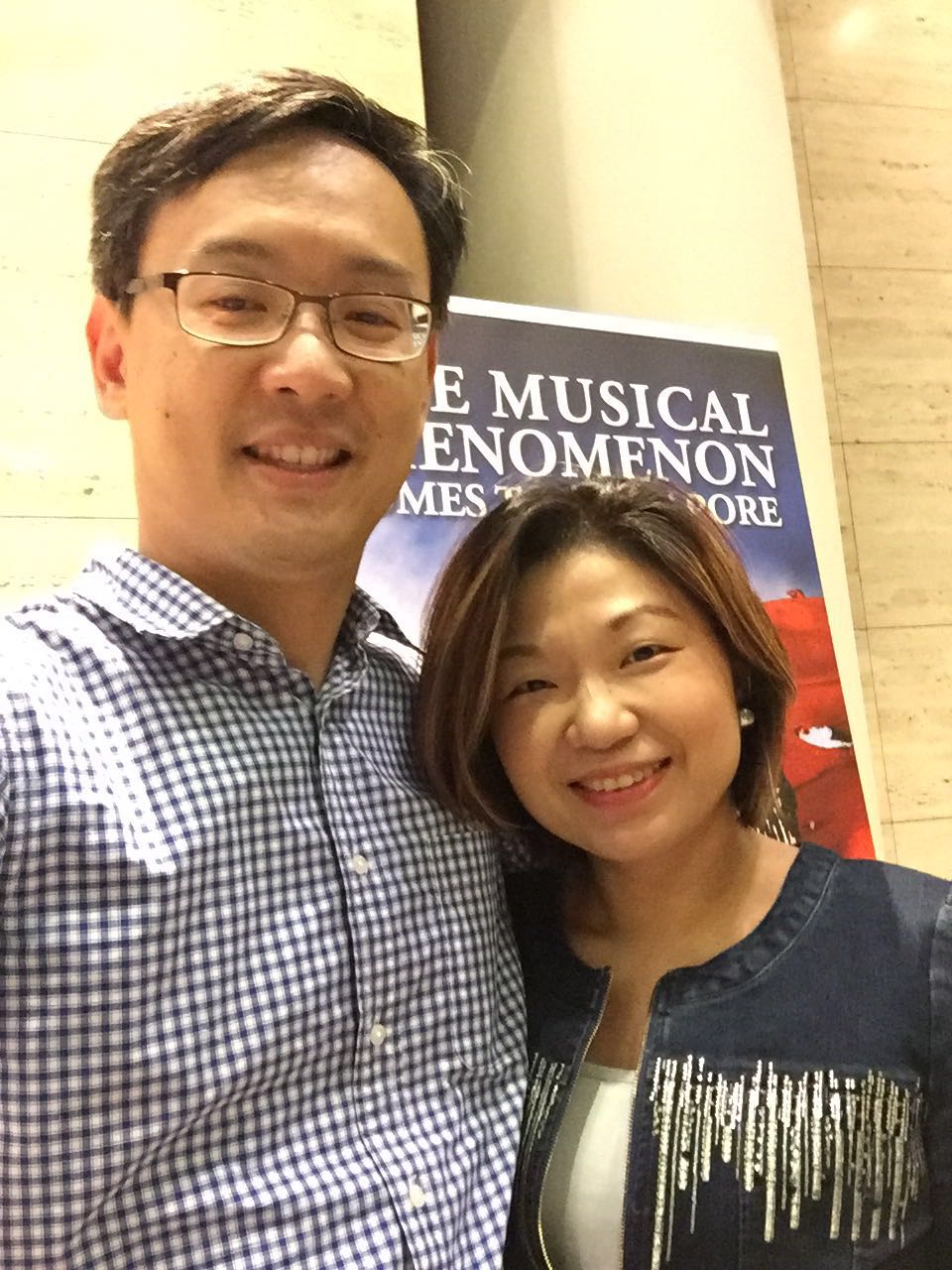 Ter Cheah, with her husband of 16 years, at the Les Miserables musical
Ter Cheah, with her husband of 16 years, at the Les Miserables musical
Her support network was strong; most showed empathy and understanding in their own way. Her teachers praised her (but not too much!) for being brave; her schoolmates included her in games and were helpful in helping her get stuff (but not for too long). To Ter Cheah, her difference only made her feel special, and it was a good kind of special.
Over the next few years, Ter Cheah underwent regular chemotherapy while schooling. Her mother was one who never once let her wallow in self-pity and molded her tolerance and tenacity to deal with her condition bravely. Ter Cheah's chemotherapy sessions were always scheduled on a Friday afternoon after school, so she would have the weekend to recuperate from the side-effects of chemotherapy, and be back in school for her lessons come Monday.
Fitting In
The initial phase of adjusting to the prosthetic leg was tough. Many times, Ter Cheah wanted to give up and hobble on one leg, but her mother, the disciplinarian in the family, always made sure she performed her daily rehabilitation exercises, something for which Ter Cheah is grateful for, on hindsight.
The years went by, and after ten long years, Ter Cheah finally achieved remission. However, in her teens, Ter Cheah's insecurities started to set in. It was the time when short skirts were in fashion (even for the junior college uniforms) and seeing other girls flaunt their legs as they sashayed around town made her feel out of place. To fit in, Ter Cheah adapted by wearing flesh-coloured stockings beneath her white socks to minimise the attention on her prosthesis. It was slightly more uncomfortable, but it made her feel just like every other girl.
.jpg) Ter Cheah with her husband and kids on a family vacation
Ter Cheah with her husband and kids on a family vacation
The teenage years were also the pubescent age of teenage love, and for Ter Cheah, she had her own doubts on whether any guy would ever accept her condition. But her mother had advised her always to be upfront about her condition. Lay it all out on the table, her mother used to say, and if the guy cannot accept it, he will just walk away and you can save yourself from hurt later on.
And that was exactly what Ter Cheah did. And one man, to whom she has been married to for over 16 years, did not walk away. She feels very blessed to have not only found him, but to have acquired a larger family through him, who have been nothing but accepting and loving towards her.
Despite their youth, her children display maturity, complete acceptance, and even pride, of her condition. One of their occasional errands since their early childhood was to carry the prosthesis to her in the morning, if she had taken it off in a place other than next to the bed the night before. Her children's friends who know of her condition think of her as a "cool aunty" and look up to her in awe.
 Ter Cheah’s autobiography, “ONE”, which documents her journey with childhood Synovial Sarcoma
Ter Cheah’s autobiography, “ONE”, which documents her journey with childhood Synovial Sarcoma
In 2014, Ter Cheah authored a book, titled “ONE”, targeted at children. It is an autobiography of her life as a child with Synovial Sarcoma and a story of how a child with a prosthetic leg could, with the support and love of family and friends, and the consistent training by parents that she was not different from other children, could really be like everyone else. The book is available at selected bookshops, as well as online. Ter Cheah also accepts invitations to give motivational talks in schools.
For someone who was "lesser" compared to others, Ter Cheah is testament that life is what you make of it, and for her, she has made the most of it, accomplishing even more than what other "normal" people may have accomplished in their lives.
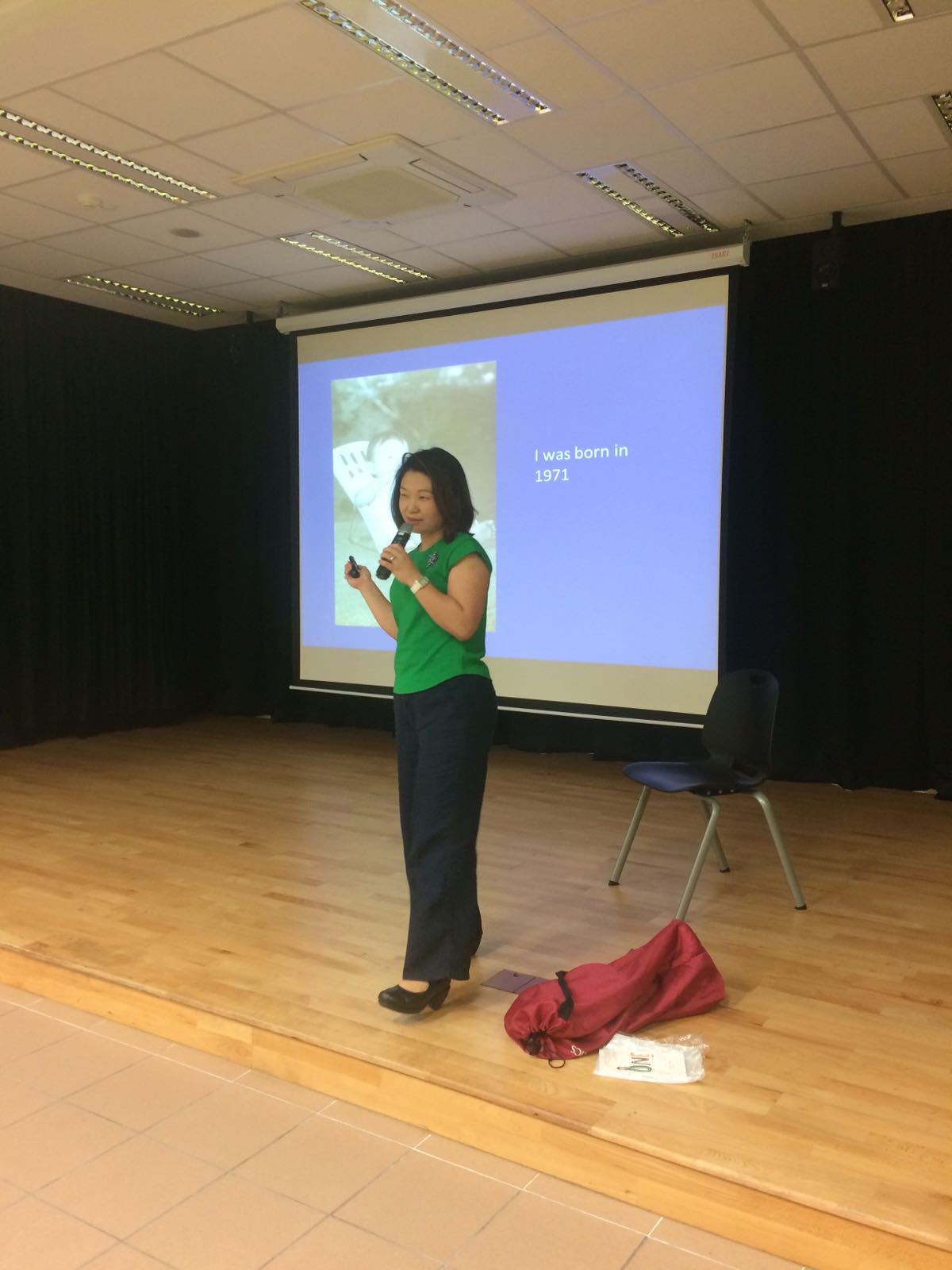
Ter Cheah, giving a talk to students about her battle with Synovial Sarcoma
A little girl with big dreams and no fear, Ter Cheah is the epitome of life beyond cancer. To other children and teenagers with cancer, this is what she has to say:
"You cannot choose what happens to you, but you can choose how to react. Sometimes, you just have to live with it and get on with life. Many times, even now, my stump will itch from rashes, and hurt from blisters, but despite the pain, I still put on my prosthesis daily and carry on walking, and eventually, the itch and pain will pass.
Everyone has some sort of disability, be it physical, emotional or mental, but the lesson we learn is how to pick ourselves up and move on. In life, there will be things to get you down, but always remember, it will pass. Life is just too precious to give up."
To parents of children or teenagers with cancer, Ter Cheah's words of advice are:
"It will work out. Do not treat the child any differently because it shapes the child's perspective. I am who I am today because of my mother, and how she never let me wallow or take advantage of my difference. Never let your child grow up believing that they are less attractive or less than any other child. They are just as attractive, and they will be loved.
The mistake parents who have special children may make is constantly highlighting that they are different. Do not let fear keep your child from doing anything. My mother may have had her misgivings, but she never stopped me from engaging in anything, sports or otherwise, that I wanted to do.
Just believe in your child and enable them."
To find out more about Sarcoma, visit the Sarcoma Support Group page here.
